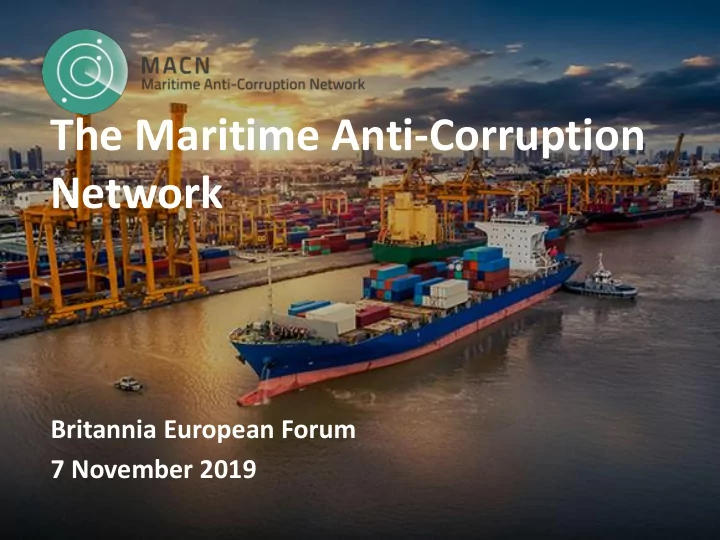

The Maritime Anti-Corruption Network Britannia European Forum 7 November 2019
The Problem What is the world’s most efficient, environmentally friendly and safest way to transport goods? Shipping.
The Problem What has one of the worst ethical reputations in the transportation industry? Shipping.
Why? • Secretive. • Bad at marketing. • Perceived as corrupt. • Vulnerable to corruption.
Why? • Dispersed floating assets. • Highly regulated. • ‘Meet the schedule at all costs’ culture. • Don’t always have sophisticated compliance programs. • Don’t speak as one voice. • Don’t use its buying power to effect change.
Solution? Need an organization of shipowners who share best practices, use their buying power to effect change and speak as one voice. The Maritime Anti-Corruption Network.
MACN in Brief 1. Created 7 years ago by 8 shipowners. 2. Grown to 123 members. 3. Represents over 30% of global tonnage. 4. Represents all industry sectors and regions. 5. Operates as a ‘Network’ for collective action and sharing best practices amongst members.
MACN Participating Members
MACN in Brief Business Driven: • MACN is unique in terms of its size, scope of work and outcomes. • MACN was created by business and remains driven by business . • MACN is one of the world’s leading anti-corruption initiatives. Solution Oriented: • MACN promotes the shipping industry as an industry that wants to drive compliance and best practices on the water. • We avoid a “blaming exercise” with stakeholders we work with. • We focus on results not reports. Collective Buying Power: • We make it clear that the shipping industry is part of the solution - not the problem. • We work with stakeholders in-country for real change on the ground. • We use our collective buying power to effect change and share best practices .
MACN’s Strategy – The 3 C’s • Collective Action In-country projects in high corruption areas. • Capability Building Providing industry-leading innovative solutions to our members. • Collaboration Working with maritime universities, regional partners, industry associations and maritime authorities.
Collective Action _______________________________________________________________ • Tackling corruption successfully requires joining forces across the value chain, but also engaging governments and civil society. • MACN believes sustainable changes in the operating environment will only take effect if they are enabled and supported by key stakeholders • MACN collective action projects include root cause analyses and implementation of ’recommended actions’ that tackle corruption in ports and across the maritime supply chain.
MACN Collective Actions Overview: India Collective action training port officials and creating system of reporting. Thailand Egypt Best practice sessions Successful ‘Say No’ with port officials and campaign in the Suez Canal. industry. Indonesia Anti-corruption project focused on customs. Argentina Establishment of a new inspection regime in Nigeria Argentina to address Training of port officials, China major corruption issues in new reporting and Ongoing study of challenges in hold inspections. accountability and ‘say no’ Chinese ports and discussions campaign. with local port officials
Capability Building: Why and How _______________________________________________________________ • Frontline must feel supported by strong policies and principles when rejecting corrupt demands. • MACN provides a useful forum for members to share challenges and best practices , collectively assessing their internal procedures, approaches and developing open-sourced solutions. • Following the MACN Anti-Corruption Principles, MACN develops shared methodologies, frameworks, trainings, and campaigns, helping each member company to strengthen its approach to tackling corruption .
Capability Building: Outcomes _______________________________________________________________ • The MACN Risk Assessment Tool helps companies to rate and assess the potential corruption risks. • A MACN Integrity Training Toolkit tailor-made for captains, onboard staff, compliance officers in shipping, and senior management. • E-Learning for captains and crews on how to deal with corrupt demands. • A handbook on reporting, discipline, and incentives, combining member input with external research to provide guidance and best practices for members, is available online. • Chatham House forums at bi-annual members meetings. • An anonymous incident reporting system allow members to share information on challenges and best practices with over 30,000 incidents recorded so far .
Collaboration _______________________________________________________________ • Work with IMO , ICS and other world shipping organizations. • Port integrity index piloted in Nigeria. • Partnerships created with maritime universities and crewing agencies to provide anti-corruption training to crews, officers and port agents. • MACN aims to support the supply chain with tools and integrity training to raise the compliance standard across the maritime industry. Together, we can make a difference.
https://www.youtube.com/watch?v=6iQqYj1fa_8
MACN’s vision: A maritime industry free of corruption. For more information: Contact the MACN Secretariat: macn@bsr.org Visit the MACN website: www.maritime-acn.org
Recommend
More recommend